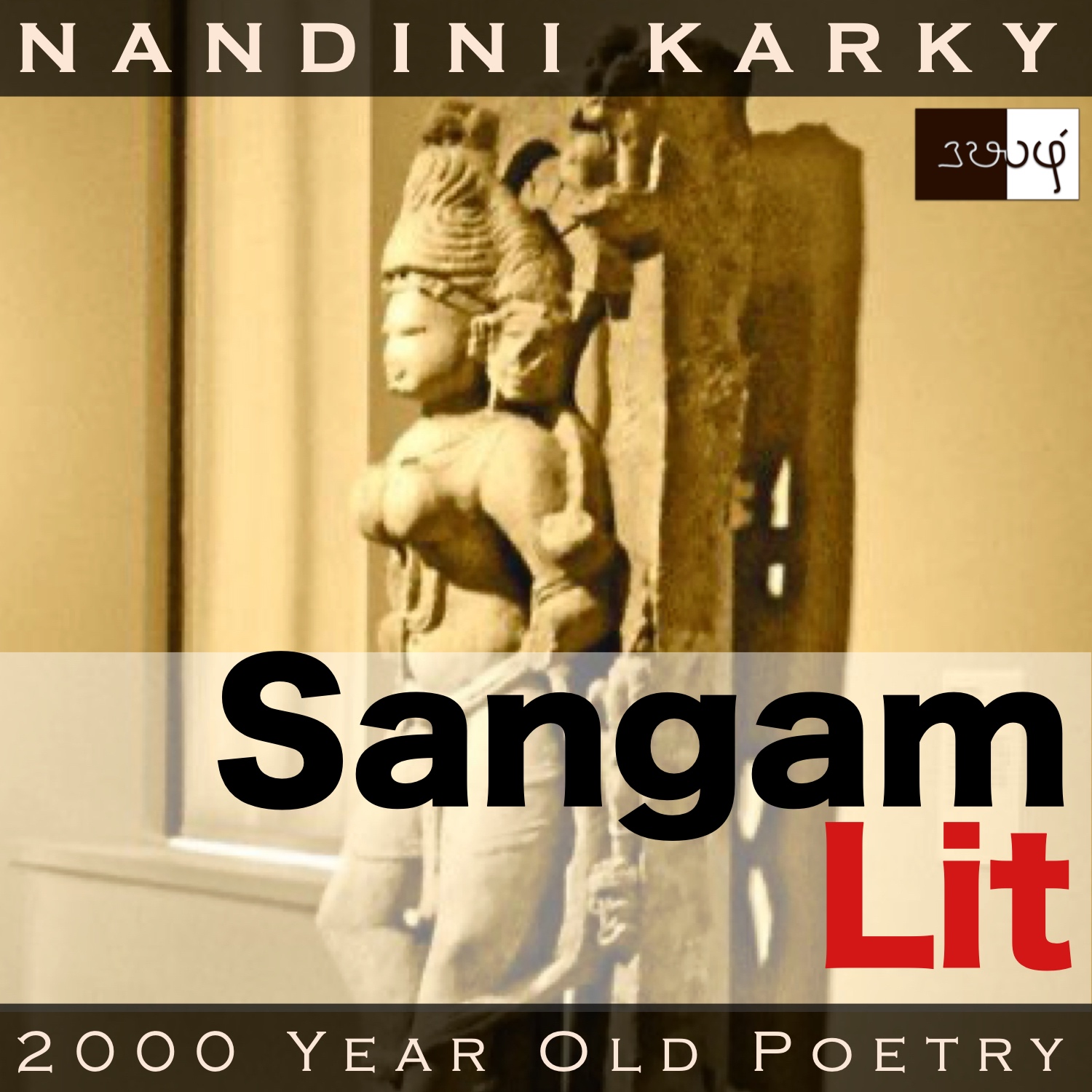Podcast: Play in new window | Download
Subscribe: Apple Podcasts | Spotify | Amazon Music | Android | iHeartRadio | Email | TuneIn | RSS | More

In this episode, we learn about a moment in history through the poetic device of a simile, as depicted in Sangam literary work, Natrinai 170, penned by an anonymous poet. Set in ‘Marutham’ or the agricultural lands, the verse speaks in the voice of the confidante to her friends, refusing entry to a danseuse to a festival being held at home.
மடக்கண், தகரக் கூந்தல், பணைத்தோள்,
வார்ந்த வால் எயிற்று, சேர்ந்து செறி குறங்கின்,
பிணையல் அம் தழை தைஇ, துணையிலள்
விழவுக் களம் பொலிய வந்து நின்றனளே;
எழுமினோ எழுமின், எம் கொழுநற் காக்கம்
ஆரியர் துவன்றிய பேர் இசை முள்ளூர்ப்,
பலர் உடன் கழித்த ஒள் வாள் மலையனது
ஒரு வேற்கு ஓடியாங்கு, நம்
பன்மையது எவனோ, இவள் வன்மை தலைப்படினே?
The poem opens with a list of attributes about a woman, starting with ‘மடக்கண்’, not ‘foolish eyes’ as it would be read in contemporary language but ‘innocent eyes’ in this ancient verse. As we have seen in many instances prior, the word ‘மட’ is associated with youth and naïveté in Sangam terminology. ‘பிணையல் அம் தழை தைஇ’ talks about the high fashion of those times, describing a ‘dress well-stitched with leaves and shoots’. The phrase ‘எழுமினோ எழுமின்’ is a call to action meaning ‘Rise, rise up’! Who is being roused thus? We’ll discover soon.
The man and lady had been leading a married life, when he takes to the company of courtesans. One day, he sends a danseuse to his home, as a messenger to appease his angry wife. The confidante, seeing the danseuse, says to her friends, “Young, innocent eyes; tresses smoothened with fragrant paste; bamboo-like shoulders; perfect, shining white teeth; well-rounded, close-set thighs; well-woven attire of tender leaves; Bearing all this, without anyone for company, she stands, dazzling the festival scene here. Rise, O friends, rise to guard your men! In that famous battlefield of Mullur, ’Ariyars’ in huge numbers waged war. But, the moment they glimpsed the power of the lone spear of ‘Malaiyan’, they scattered in fear. Likewise, it will not matter that we are many, for we shall fail before her prowess!” With these words, the confidante refuses to entertain the danseuse and also reveals, that the lord is still close to the heart of the lady.
Time to analyse the significance of the event embedded in this verse! The word ‘Ariyar’ piqued my curiosity no end. Having read about varying theories on the Aryan-Dravidian divide, I wanted to understand the meaning in which the word ‘Ariyar’ has been used in this verse. Before we go there, another detailed look at that historical event. The confidante says, the ‘Ariyars’ arrived in huge numbers and attacked on the battlefield of ‘Mullur’ but seeing the skill of Malaiyan’s spear, they ran away, embracing defeat. As we have seen in Natrinai 77, ’Malaiyan’ is the epithet given to the Sangam King ‘Thirumudi Kaari’, one of the last seven patrons of the Sangam age. He has been praised for his valour on the battlefield in many poems and here too, the poet praises the flash of his spear, that subdues hordes of the enemy. The confidante says this to remark that no matter how many in number they are, they would fail before the wily nature of the danseuse, if they do not protect their lord, with caution.
Leaving the concern of these ladies, we return to the question of the ‘Ariyar’. Who were they? Where did they come from? Geographically situating this historical event, we learn that Malaiyan was a feudal lord, who ruled over the region of ‘Thirukovilur’ in current-day Villupuram district. His help had been sought by many a king and the prominent among them were the Chera kings, who ruled the eastern region of ancient Tamil land. Researchers conclude that this term ‘Ariyar’ does not refer to foreigners, as described in those theories, but other people of India, who lived immediately north of the then Tamil kingdoms. After these meanderings through the past, I just want to reflect on how a few lines of verse about the intricate emotions of a man and woman also reveal far-reaching facets of history. Poetry indeed serves as the window to the past and present, and to the within and without!




Share your thoughts...